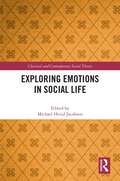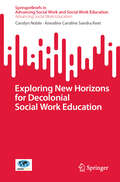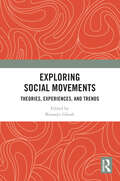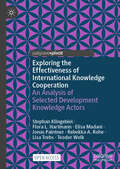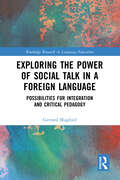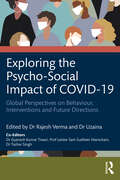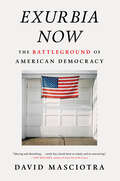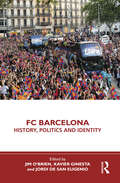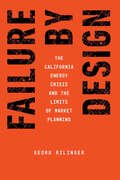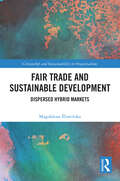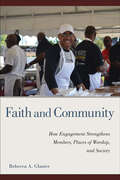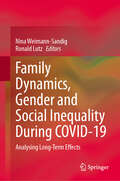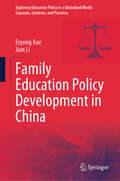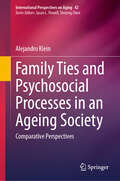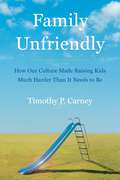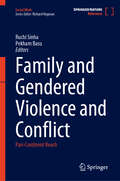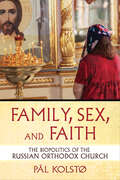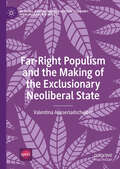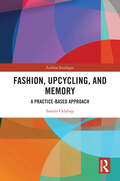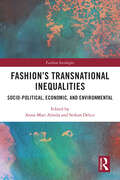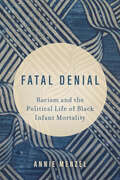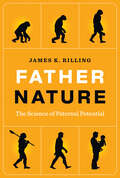- Table View
- List View
Explorations in Dynamic Semiosis (Theory and History in the Human and Social Sciences)
by Elli Marie TragelThis anthology is a manifold combining semiotics and psychology. Chapters in the book are authored by young scholars making sense of semiosis in irreversible time from a multitude of perspectives. The central focus on the dynamics of meaning-making comes together in a variety of topics that align in the core idea of dynamic nature of human making and use of signs. First, this book gives a comprehensive overview of relational dynamics of the sign. The overview is followed by a collection of chapters focusing on various topics relevant for humanities and social sciences, such as experience of time, (cultural) memory, musical signification, human-computer interactions, death and eternity, freedom and responsibility, authenticity, methods for practice and research in psychology, etc. This anthology contributes to the integration of the fields of semiotics and psychology, building on the classic traditions of the Tartu-Moscow School of Semiotics (established by Juri Lotman) and contemporary cultural psychology that has unified social sciences in the recent three decades. Examples of how new semiotic models are applied to various domains of human lives will be given, anticipating the future and addressing its past. As such, this book is a relevant read for everyone interested in the complex nature of meaning-making, and inclusion of dynamics in all expressions of life, including academic research.
Exploring Emotions in Social Life (Classical and Contemporary Social Theory)
by Michael Hviid JacobsenThis volume presents a broad range of studies on a variety of emotions from social scientific perspectives. Bringing together scholars from disciplines including sociology, psychology, anthropology and philosophy, it examines emotions including desire, empathy, freedom, happiness, hate, disgust, humiliation, guilt, unemotionality and despair, exploring the main facets of these emotions and considering the ways in which they are manifested and folded into our cultural and social lives. It will therefore appeal to scholars across the social sciences with interests in emotion, affect and contemporary culture.
Exploring New Horizons for Decolonial Social Work Education (SpringerBriefs in Advancing Social Work and Social Work Education)
by Carolyn Noble Annaline Caroline KeetThis book presents current scholarship designed to decolonize, reform and confront the Euro-centric dominance in social work education and practice. This compact volume strings together new content from internationally recognised authors in the field of social work to address this need. Decolonising social work seeks to weaken the effect of colonialism and create opportunities to promote traditional practices in contemporary settings. Its focus is to draw attention to the effects of globalisation and the universalization of social work education, methods of practice and international development that fail to embrace and recognise local knowledges and methods by bringing new and fresh perspectives to social work. It can also be seen as a significant contribution to social work's more critical stance and long-standing struggle to challenge the hegemonic Euro-centric epistemology. With decoloniality becoming a global imperative, this collection brings together case studies from world scholars and decolonial voices in order to explore opportunities, challenges and trends to decolonize through culturally relevant curricula, including: Social Work and Decolonisation: Student Social Workers’ Understanding of the Concepts of ‘Culture’, ‘Cultural Identity’ and ‘Decolonisation’ Developing Curriculum for Criminal Justice Social Work from the Field New Directions in Trauma Work? Cultural Trauma Theory as an Instrument to Contextualise and Address Histories of Pain in Global Communities Analysing and Understanding Intersections: Using Nayak’s ‘Intersectional Model of Reflection’ in Social Work Teaching Decolonizing Social Work Education and Curriculum Utilizing Cultural Competemility and Professionalism Approach Exploring New Horizons for Decolonial Social Work Education is essential reading for practitioners, policy makers, instructors, researchers, and other social work professionals. The book may be used as a supplemental text for social work courses. The national and international focus of the volume will be highly relevant to all social work programmes across the globe.
Exploring Social Movements: Theories, Experiences, and Trends
by Biswajit GhoshThis book introduces the readers to the dynamics of various kinds of social movements. It examines how social movements have become an instrument of social change including assertion of identity and protest against marginalisation. This book describes three major domains – conceptual, experiential, and the impact of globalisation on social movements. The volume begins by locating social movements within broad and contemporary social processes and explores the intrinsic and complex patterns of dynamics among state, market, and social movements from a critical sociological perspective. It explains the meaning, basic features, origins and types, leadership and ideology, and perspectives of social movements and probes into major experiences of eight social movements in India, namely, peasant and farmers, tribal, Naxalite and Maoist, Dalit, working class, women, ethnic, and environmental movements. This book also analyses the role of information technology, media, and civil society in the spread and continuation of such movements. The experiences of queer, new religious, anti-systemic, and anti-displacement movements would also help readers understand how globalisation has offered new avenues of protest to diverse sections of the population. Lessons of anti-globalisation movements across the world provide a futuristic perspective in assessing the strength of social movements in a global society.This book will be useful to the students, researchers, and faculty working in the field of political science, sociology, gender studies, and post-colonial contemporary Indian politics in particular. It will also be an invaluable and interesting reading for those interested in South Asian studies.
Exploring the Effectiveness of International Knowledge Cooperation: An Analysis of Selected Development Knowledge Actors
by Stephan Klingebiel Flora L. Hartmann Elisa Madani Jonas Paintner Rebekka A. Rohe Lisa Trebs Teodor WolkIn this open access book, we provide evidence to support the conceptual discussion of what constitutes “modalities of knowledge interaction” and suggest an analytical framework for effective knowledge cooperation. In practice, knowledge cooperation is realised through different modalities that serve as a toolbox to co-create, share and communicate knowledge among actors. Effective knowledge cooperation is crucial to addressing global challenges. It is increasingly attracting attention due to the rise of South–South Cooperation, to which it is central. Our empirical cases (Germany, India, Republic of Korea and Rwanda) comprise South-South cooperation and traditional development cooperation actors.
Exploring the Grassroots Practice of Rural Revitalization
by Tuan Yang Jianjin Liu Zhihui TongThis book shows six cases of rural grassroots cadres and masses exploring the implementation of the rural revitalization strategy. These cases show the problems encountered in the work of rural leaders and the ideas to solve contradictions (policy and reality, individual and collective), reveal the importance of organization, governance, and talent building in rural development, and emphasize that promoting rural revitalization must empower the village collective and require the active participation of all sectors of society. This work can be used as a reference book for grassroots cadres, rural revitalization workers, the public, professional researchers, and teachers and students of colleges and universities to deeply understand the grassroots practical exploration and theoretical thinking and research of rural revitalization.
Exploring the Power of Social Talk in a Foreign Language: Possibilities for Integration and Critical Pedagogy (Routledge Research in Language Education)
by Gerrard MugfordThis book examines the fundamental interactional dimension to foreign language communication, including the establishment, development, consolidation and maintenance of interpersonal relations. It argues that interpersonal language use such as small talk, casual conversation and gossipy talk is not only key to meaningful and productive communication but that it is an essential dimension with respect to successful foreign language interaction and that engaging in interpersonal language is communicatively valuable and worthwhile in its own right. Crucially, it explores how teaching and learning can utilize the role of social talk and relational engagement in helping interactants to express, voice and convey their own values, attitudes and beliefs. Finally, it develops a critical relational pedagogy focused on language speakers’ needs, objectives and desires. Redressing the imbalance between transactional and interactional language teaching, and stressing the importance of phatic and relational language use in helping language users achieve their communicative goals, it will appeal to researchers, postgraduates, and scholars in the fields of education and linguistics.
Exploring the Psycho-Social Impact of COVID-19: Global Perspectives on Behaviour, Interventions and Future Directions
by Rajesh Verma UzainaThis comprehensive resource provides a one-stop information repository, exploring all psychological aspects of Covid-19. Divided into three sections, the book covers the psycho-social impact on society and individuals and our collective cooperative behaviour, as well as philanthropic efforts, coping strategies and technological interventions, and how lessons learned will help in preparedness for the future. Including case studies and the latest research from diverse scientific studies across different regions, this book examines how psycho-social paradigms changed as a result of the pandemic, and left their watermark on the human psyche. It also explores the coping strategies adopted to deal with this common aggressor and how the techniques varied in accordance with social, cultural and geographical factors. The final section offers new insights for the future, highlighting the psychological infrastructure required, the type of preparedness and handling strategies necessary to mitigate the impact of any future biogenic pandemics. Combining theory and practical application, this is a valuable reading for academics and researchers as well as practising psychologists, clinical psychologists, and law-makers who are concerned with mental health.
Exurbia Now: The Battleground of American Democracy
by David MasciotraThe suburbs have become too liberal and diverse for many white American conservatives, so &“exurbia&”—areas outside the cities and their suburbs—are becoming the staging ground for the radical right extremist insurgency . . .Beyond a fanatical devotion to former president Donald Trump, one of the curious things that united the rank and file of the January 6 insurrectionist mob was that many of them were residents of one of America&’s fastest growing residential areas: Exurbia.Home to the likes of Georgia&’s Marjorie Taylor Greene, Ohio&’s Jim Jordan, big box retailers, chain restaurants, monster trucks, and megachurches, exurbia is becoming America&’s greatest political battleground, more important to American politics than urban or rural America. In this brilliant work of political and cultural inquiry, veteran political journalist David Masciotra provides a definitive account of what exurbia is, how it came to be, and how it's transforming American life. Zooming in outside the greater metropolitan area of Chicago—where Masciotra grew up—he shows how exurbia has become a safe space to fly the MAGA flag and romanticize the mores of the pre-civil rights, pre-feminist, pre-gay rights 1950s.But, as Masciotra also shows, reactionary white flight is not the whole story of small-town America. The story often lost is the power and persistence of small-town liberals—people who believe in equality, celebrate diversity, and enroll in movements for justice. Exurbia, as it turns out, is ground zero for the fight over a democracy mightily beleaguered, yet still full of promise, and still worth fighting for. Combining interviews, research, and anecdote—and anchored in personal experience—Exurbia Now delivers a powerful ballad on the state of small-town America, and provides a sense of the fight for democracy, on the ground, in the heartland.
FC Barcelona: History, Politics and Identity
by Jim O’Brien Xavier Ginesta de San Eugenio, JordiThis is the first critical, in-depth academic study of FC Barcelona (also known as Barça), one of the world’s great football clubs, exploring the historical, political, cultural and commercial dimensions of this global sporting institution.The book examines why and how the club grew from its genesis as a small sporting organisation in the developing urban landscape of Barcelona in 1899 to become a contemporary giant that has both shaped and transcended football. It considers how globalisation, cultural identity and political ideology can help us to understand the development of Barça, but also how the growth of the phenomenon of FC Barcelona helps us to better understand those forces shaping contemporary global societies. It brings together leading scholars from around the world to examine key themes such as governance, regional and national politics, storytelling, fandom, digital media, branding, commercialisation and sport diplomacy, exploring topics such as the European Super League fiasco and the rise of Lionel Messi as a global icon. It also includes a series of chapters looking at the importance of FC Barcelona around the world, including in Latin America, the United States, Africa and East Asia.This illuminating, multi-disciplinary study of FC Barcelona is essential reading for anybody with an interest in football, Catalonian politics and culture, or the history, politics, culture and business of sport.
Failure by Design: The California Energy Crisis and the Limits of Market Planning
by Georg RilingerA new framework for studying markets as the product of organizational planning and understanding the practical limits of market design. The Western energy crisis was one of the great financial disasters of the past century. The crisis began in April 2000, when price spikes started to rattle California’s electricity markets. Decades later, some blame economic fundamentals and ignorant politicians, while others accuse the energy sellers who raided the markets. In Failure by Design, sociologist Georg Rilinger offers a different explanation, one that focuses on the practical challenges of market design. The unique physical attributes of electricity made it exceedingly difficult to introduce markets into the coordination of the electricity system, so market designers were brought in to construct the infrastructures that coordinate how market participants interact. An exercise in social engineering, these infrastructures were intended to guide market actors toward behavior that would produce optimal market results and facilitate grid management. Yet, though these experts spent their days worrying about incentive misalignment and market manipulation, they unintentionally created a system riddled with opportunities for destructive behavior. Rilinger’s analysis not only illuminates the California energy crisis but also develops a broader theoretical framework for thinking about markets as the products of organizational planning and the limits of social engineering, contributing broadly to sociological and economic thinking about the nature of markets.
Fair Trade and Sustainable Development: Dispersed Hybrid Markets (Citizenship and Sustainability in Organizations)
by Magdalena ŚliwińskaFair Trade constitutes a social-business initiative that plays a crucial role in the transition towards a "sustainable market economy", countering the major challenges of the 21st century. This research monograph reveals the mechanisms behind this process. It argues that Fair Trade constitutes a new type of market, "a Dispersed Hybrid Market (DHM)", that due to its specific features contributes to a more pro-social functioning of the entire market and taking responsibility for sustainable development by different market participants. It demonstrates, thus, what was underestimated about Fair Trade, and which is extremely important, that it can have a positive impact on the market in terms of sustainable transformation. The book is intended for researchers, lecturers, students, practitioners, and political decision-makers interested in sustainable development, Fair Trade, and transition towards sustainable markets, business, and economy. It contributes to better understanding of sustainability challenges explaining specifics of Fair Trade market, revealing paradoxes and barriers of its development and showing mechanisms of its spillover effects. It also develops arguments about the need to change the role of the state in the face of global challenges and to support such grassroots international initiatives as Fair Trade. Therefore the practical recommendations address both the desired directions of development of the self-governance of this initiative and the expected role of the state towards it, in particular possible ways to strengthen it.
Faith and Community: How Engagement Strengthens Members, Places of Worship, and Society (Religious Engagement in Democratic Politics)
by Rebecca A. GlazierPlaces of worship are important anchor institutions in communities, helping to create social capital through discussion groups, soup kitchens, and neighborhood clean-ups. While congregations face increasing pressures, from declining attendance to political polarization, community engagement is an overall positive for their members and for democracy. Faith and Community shows the benefits of religious people taking action in their communities. Through more than a decade of multi-method data collection, Rebecca Glazier surveyed over 4,000 congregants and nearly 500 clergy in Little Rock, Arkansas to gather opinions from members and leaders on community issues and engagement. Together with interviews and case studies, her findings indicate that active congregants are happier and more civically involved. Faith and Community provides valuable insights into the relationship between religion and community engagement. The data illustrates how community engagement benefits individuals, congregations, and democracy and offers one solution to what ails religion in America today.
Familie im Wandel: Sozialwissenschaftliche, ethische und rechtliche Perspektiven (Kindheit – Bildung – Erziehung. Philosophische Perspektiven)
by Gottfried Schweiger Bernadette Breunig Angelika WalserDie Familie unterliegt einem steten Wandel, und zwar sowohl im Hinblick auf ihre Form als auch auf ihre Bedeutung und nicht zuletzt ihre Regulierung durch legale, kulturelle, religiöse oder moralische Normen. Welche Formen der Beziehung als konstitutiv für die Familie angesehen werden, steht ebenso zur Diskussion wie die Frage der Anerkennung und des Schutzes der Familie und verschiedener Familienformen durch den Staat. Insbesondere Techniken der Reproduktion und Veränderungen des sozialen Gefüges in Loslösung der ‚klassischen‘ Kernfamilie haben eine Vielzahl an neuen Familienformen wie Patchworkfamilien, Co-Parenting-Familien oder Familien mit gleichgeschlechtlichen Elternpaaren ermöglicht und normalisiert. Ziel dieses Bandes ist es, verschiedene disziplinären Perspektiven aus den Sozial- und Rechtswissenschaften, der Theologie und Philosophie zusammenzubringen, die auf die Familie und ihren Wandel mit Blick auf ausgewählte Fragestellungen und Familienformen reflektieren – wobei Co-Parenting und assistierte Reproduktion besonders im Fokus liegen.
Family Dynamics, Gender and Social Inequality During COVID-19: Analysing Long-Term Effects
by Ronald Lutz Nina Weimann-SandigThis book critically analyzes both the negative and positive impacts of the Coronavirus pandemic, focusing on changes in families, gender developments, and the evolution of social inequality structures. The Corona pandemic, with its unprecedented restrictions on contact, has meant that families have been challenged in their functioning in a very special way. International studies show that socioeconomic factors such as education, income, but also the geographic center of life of families and women in particular, had an important influence on the management of the pandemic. Despite all negative side effects of the Corona pandemic, there were nevertheless also innovative impulses, especially in the field of social work, particularly work with families. The book's 18 chapters, organized in six sections, highlight not only short-term changes but also longer-term developments that either require a corresponding concept of measures or action or can be evaluated as drivers of innovation in the pandemic. Part I: IntroductionPart II: Family DynamicsPart III: Child Well-being Part IV: Social Work with Children and FamiliesPart V: Gender and COVID-19Part VI: Conclusion The special feature of the volume is its global perspective. Authors from different countries describe changes and developments on these topics and make clear what profound effects the pandemic had on families, social inequality structures, and gender-specific situations. The anthology does not comprehensively reflect international perspectives. Rather, it leaves it up to readers to compare the developments in the respective countries with their own country of origin from a comparative cultural perspective. In this way, ideas for future, overarching research projects may be stimulated.Family Dynamics, Gender and Social Inequality During COVID-19 is timely and relevant reading for scientists, students, and practitioners in sociology, social work, and political science.
Family Education Policy Development in China (Exploring Education Policy in a Globalized World: Concepts, Contexts, and Practices)
by Jian Li Eryong XueThis book provides a comprehensive overview of family education policy development in China. Each chapter draws upon existing literature, reviews the policy text and implementation data, identifies the challenges of and problems in the policy implementation process, and proposes corresponding countermeasures and solutions. It examines a wide range of education policies in China, including the management policy of family education organization, family education resource allocation policy, family education guidance service policy, the educational policy on the parent-school cooperation, school support-based family education policy, community support-based family education policy, family education monitoring and evaluation policy, and family education responsibility sharing policy.
Family Ties and Psychosocial Processes in an Ageing Society: Comparative Perspectives (International Perspectives on Aging #42)
by Alejandro KleinThis book contributes to the discussion on the ageing society by addressing the new psycho-social structures of the ageing society, the problems around family bonds and ties, and the structures of care and protection. The book sheds light on the new roles of grandparents and new grandparents, and the empowerment and resilience initiatives, thereby providing a broad discussion of what the ageing society implies in psychosocial terms. These issues are addressed in an interdisciplinary way, but also in an approach that is also rare, comparing different realities between Europe and Latin America. The [basis of the] English translation of this book from its Spanish original manuscript was done with the help of artificial intelligence. A subsequent human revision of the content was done by the author.
Family Unfriendly: How Our Culture Made Raising Kids Much Harder Than It Needs to Be
by Timothy P CarneyThe bestselling author of Alienated America traveled the country asking families and experts the same two questions: Why is parenting so hard now? And why are the results so bad?Our culture tells parents there's one best way to raise kids: enroll them in a dozen activities, protect them from trauma, and get them into the most expensive college you can. If you can't do that, don't bother.How is that going? Record rates of anxiety, depression, medication, debts, loneliness and more. In Family Unfriendly, bestselling author and Washington Examiner columnist Timothy P. Carney says it's time to end this failed experiment in overparenting.Have more kids, have more fun, cancel the travel soccer games, let your kids wander off, and give them deeper sources of meaning than material success. This is an old-fashioned view, but every day the evidence validates it. Drawing on rigorous research—both as a reporter and as a dad of six—Carney demonstrates why modern parenting is so misguided. The high standards set for modern American parenting are unrealistic and setting parents—and our kids—up to fail.Researched over three years and written in between rec baseball games and church picnics where nobody was watching the kids, Family Unfriendly is deeply wise, energetically told, and destined to be the most consequential book about parenting in years.
Family and Gendered Violence and Conflict: Pan-Continent Reach (Social Work)
by Ruchi Sinha Pekham BasuThis reference work collates academic discourses and practices around family, gender, and violence in social work. A huge body of discourse is available that categorizes and labels acts of violence, and correspondingly practices that pin blame/responsibility for the violence. These have led to evolution of intervention strategies to resolve or address the violence. Some explanations foreground systemic causes; others look at person-centric causes. The two views bring forth the fundamental ontological divide of structuralism and individualism. The question for social workers to debate is what to factor in while working with families experiencing violence and conflict. What amongst the person, the agency, or the structure needs to be addressed to understand the experience of families in conflict and violence? Are these positions supplementary, complementary, or to be understood reflexively? With the inclusion of new families, the parochial understanding of families has long been dislodged and given way to newer, radical, and contextual understanding of families. Similarly, different people, agencies, and states understand violence and conflict differently. Gender, too, has moved from the binaries of male and female to the gender-diverse LGBTQIA+ identities. The book positions the ontological premise on which the epistemological practise is located. Simply put, the person-centric ontology on families and violence epistemologically finds understanding in agency-based approaches in individual agency, whereas the structure-based approaches find the experience of families and violence in society, state, and the world order. The contributors locate their work around identification, definition, an intervention or empirical study, policy analysis, historical evolution of concepts, and ontological and paradigmatic debates to position their individual chapters. Family and Gendered Violence and Conflict: Pan-Continent Reach provides a paradigmatic prism for practice for social workers who are equipped to interpret context differently. The differing and competing paradigmatic lenses cannot be mediated, resolved, or addressed, but they definitely can be understood and debated to provide a 360-degree lens on the issues of families in violence in the gendered context. The reference work is a useful resource for social work practitioners, educators, academicians, researchers, and other development professionals.
Family, Sex, and Faith: The Biopolitics of the Russian Orthodox Church (NIU Series in Slavic, East European, and Eurasian Studies)
by Pål KolstøFamily, Sex, and Faith is the first systematic examination of what the Russian Orthodox Church (ROC) teaches and how believers respond to its messages regarding issues such as marriage, divorce, contraception, abortion, husband-wife relations, and LGBTQIA+ rights. According to Pål Kolstø, for the ROC, the ethics of private life involve what Michel Foucault called "biopolitics": the state regulates the sex lives of its citizens to control the development of the population.Family, Sex, and Faith offers a systematic analysis of aspects of the moral theology of the ROC, discussing the means and strategies it employs to achieve its goals, to counter resistance, and to emerge victorious from the battles in which it is embroiled. Although the constitution defines Russia as a secular state, the ROC has achieved a privileged position in society, functioning as a major provider of ideology and legitimacy for the Putin regime.
Far-Right Populism and the Making of the Exclusionary Neoliberal State (Building a Sustainable Political Economy: SPERI Research & Policy)
by Valentina AusserladscheiderThis book examines the rise of exclusionary neoliberalism by assessing how far-right populist actors impact economic policy change. Drawing on the case of the Austrian Freedom Party, the book illustrates how neoliberalism emerged as a far-right political project in Austria. Tracing the Freedom Party´s ideational history, the book describes the making of the exclusionary neoliberal state through its establishment in the 1980s, its implementation in the early 2000s and how exclusionary neoliberalism was sustained after the Great Financial Crisis of 2008. The book thereby provides important insights on how domestic politics respond to challenges imposed by globalization and international market integration, and explains the less obvious ways in which exclusionary nationalist ideas can be deeply entangled with neoliberalism. The book will appeal to all those interested in far-right populism and its interrelation with political economy.
Fashion, Upcycling, and Memory: A Practice-Based Approach (Fashion Sociologies)
by Sanem OdabaşıFashion, Upcycling, and Memory questions practices and explores its profound connection to memory and sustainability. Through a practice-based researcher lens, the research examines the intricate interplay between upcycling and memory, unveiling assemblages of concepts, objects, and values that inspire action.This book takes readers on a journey through the multidimensional relationship between individuals and clothing. It delves into the disposal of garments and the transformative aspirations embedded within the fashion industry. Employing the unique research methodology known as "A/r/t/ography," which merges artistic practice, rigorous research, and educational development, this book unearths the dynamic interplay between upcycling and memory.The author unravels the intricate web of connections within upcycling through diverse practices, methods, and insightful interviews. By critically questioning established norms and scrutinizing the actions of fashion designers, the book makes significant contributions to existing literature. Additionally, it offers practical recommendations for sustainable fashion education, making it an indispensable resource for individuals involved in the textile and fashion field. Enhanced with visual aids such as images and illustrations, this book ensures an engaging reading experience that immerses readers in the research-based discourse.
Fashion’s Transnational Inequalities: Socio-Political, Economic, and Environmental (Fashion Sociologies)
by Anna-Mari Almila and Serkan DeliceThis book explores the evolving relationship between fashion and transnational capitalism. It examines the inequalities and injustices that this relationship embodies and engenders within the interconnected domains of production, consumption, labour, and environmental ethics. It also considers national and transnational ways of evading, resisting, and dismantling those inequalities and injustices. An accessible and compelling read, Fashion’s Transnational Inequalities will appeal to students and scholars of fashion, sociology, politics, cultural studies, and all those interested in deconstructing the inequalities that exist in the fashion industry globally.
Fatal Denial: Racism and the Political Life of Black Infant Mortality (Reproductive Justice: A New Vision for the 21st Century #9)
by Annie MenzelFatal Denial argues that over the past 150 years, US health authorities’ explanations of and interventions into Black infant mortality have been characterized by the "biopolitics of racial innocence," a term describing the institutionalized mechanisms in health care and policy that have at once obscured, enabled, and perpetuated systemic infanticide by blaming Black mothers and communities themselves. Following Black feminist scholarship demonstrating that the commodification and theft of Black women’s reproductive bodies, labors, and care is foundational to US racial capitalism, Annie Menzel posits that the polity has made Black infants vulnerable to preventable death. Drawing on key Black political thought and praxis around infant mortality—from W.E.B. Du Bois and Mary Church Terrell to Black midwives and birth workers—this work also tracks continued refusals to acknowledge this routinized reproductive violence, illuminating both a rich history of care and the possibility of more transformative futures.
Father Nature: The Science of Paternal Potential
by James K. RillingHow and why human males evolved the capacity to be highly involved caregivers—and why some are more involved than others.We all know the importance of mothers. They are typically as paramount in the wild as they are in human relationships. But what about fathers? In most mammals, including our closest living primate relatives, fathers have little to no involvement in raising their offspring—and sometimes even kill the offspring sired by other fathers. How, then, can we explain modern fathers having the capacity to be highly engaged parents? In Father Nature, James Rilling explores how humans have evolved to endow modern fathers with this potential and considers why this capacity evolved in humans.Paternal caregiving is advantageous to children and, by extension, to society at large, yet variable both across and within human societies. Rilling considers how to explain this variability and what social and policy changes might be implemented to increase positive paternal involvement. Along the way, Father Nature also covers the impact fathers have on children&’s development, the evolution of paternal caregiving, how natural selection adapted male physiology for caregiving, and finally, what lessons an expecting father can take away from the book, as well as what benefits they themselves get from raising children, including increased longevity and &“younger&” brains.A beautifully written book by a father himself, Father Nature is a much-needed—and deeply rewarding—look at the science behind &“good&” paternal behavior in humans.

